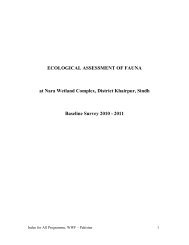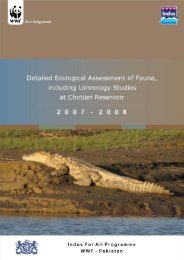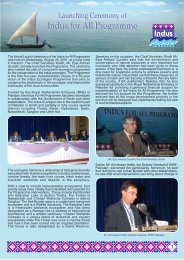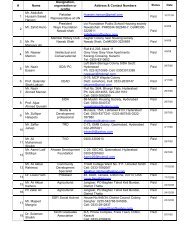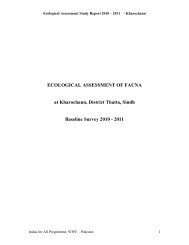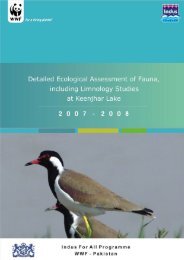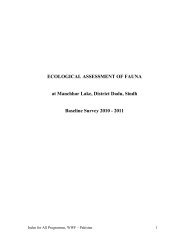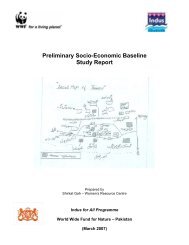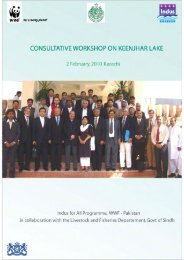Disclaimer note - WWF - Pakistan
Disclaimer note - WWF - Pakistan
Disclaimer note - WWF - Pakistan
Create successful ePaper yourself
Turn your PDF publications into a flip-book with our unique Google optimized e-Paper software.
Detailed Ecological Assessment Report 2008 – Keti Bunder<br />
by <strong>WWF</strong> - <strong>Pakistan</strong>. The area is totally deprived of any water supply<br />
system, except for Bhoori village which has 10 hand pumps providing<br />
sweet water because the village is located in Khobar creek; which is<br />
currently the main course of Indus River falling in the Arabian Sea.<br />
Communities purchase drinking water on comparatively high prices thus<br />
facing an added stress on their subsistent livings.<br />
A recent socio-economic study undertaken by Indus for All Programme<br />
revealed that the average household size of Keti Bunder area has 6.6<br />
members. About one-fifth of households have only 3 members and such<br />
households were predominant at Keti Bunder. The study also revealed<br />
that about 78.4% households are engaged in fishing followed by daily<br />
labor, business and other miscellaneous occupations. In creek areas a<br />
fraction of the households (1 – 2%) possess small and large ruminants.<br />
• Resources<br />
Proportion of family members engaged in different occupations depicts<br />
that 3% households possess poultry birds. The study examined that local<br />
population heavily rely on natural resources such as drinking water (94%),<br />
fish (88%), fuel wood (75%), and pastures (37%), a majority of the<br />
households in creeks and inland areas believe that natural resources such<br />
as drinking water, fish and forests have declined over the past five years.<br />
About 48% of respondents agreed that irrigation water resources have<br />
depleted during the last five years. Over 70% of respondents agreed that<br />
the fisheries have declined, while 64% agreed that forest resources have<br />
sharply depleted during the last 5 years. Depletion of fisheries, being the<br />
primary source of livelihood, was perceived to be highest at Keti Bunder<br />
(87% of respondents).<br />
1.2 Rationale and Objectives<br />
1.2.1 Large Mammals Survey<br />
1.2.1.1 Rationale<br />
The Indus Eco-region is one of the forty biologically richest eco-regions in the<br />
world, as identified by <strong>WWF</strong>. The Indus Eco-region Programme (IEP) is a 50<br />
years long (2005 - 2055) initiative of <strong>WWF</strong> - <strong>Pakistan</strong> and the Government of<br />
Sindh that will address poverty and natural resource degradation in the Indus<br />
eco-region. In the Biodiversity Visioning and Eco-region Conservation Planning<br />
Workshop for the Indus Eco-region, held in Karachi in July 2004, participants<br />
identified fifteen prioritized areas within the Indus eco-region (<strong>WWF</strong> – P 2008). An<br />
Indus for All Programme of the IEP has been implemented on five out of fifteen<br />
prioritized landscapes with support from Royal Netherlands Embassy (RNE) in<br />
July 2006 for a period of six years. The five sites are Keti Bunder (coastal),<br />
Keenjhar Lake (fresh water ecosystem), Pai Forest (irrigated forest), Chotiari<br />
Reservoir (desert ecosystem) and Keti Shah Forest (riverine forest). The<br />
Programme aims to work with all relevant stakeholders at field, district, provincial<br />
and national levels to build capacity, support and influence planning and<br />
mainstreaming of poverty-environment nexus.<br />
The detailed ecological assessment of the project sites has been initiated as an<br />
output of the Programme to establish a baseline in and around the project sites.<br />
The baseline will determine key livelihoods interventions of Indus for All<br />
Programme by identifying the gaps and opportunities.<br />
<strong>WWF</strong> <strong>Pakistan</strong> – Indus for All Programme Page 6 of 188



